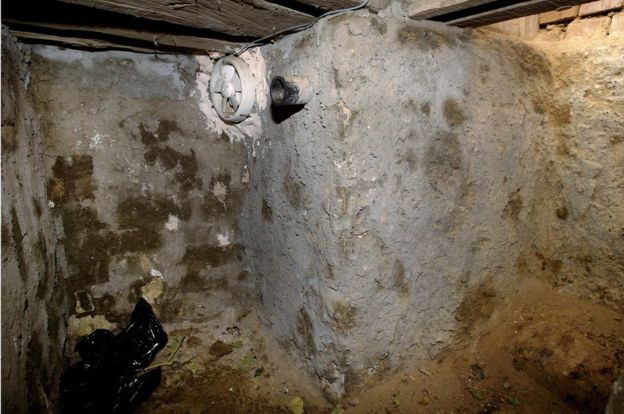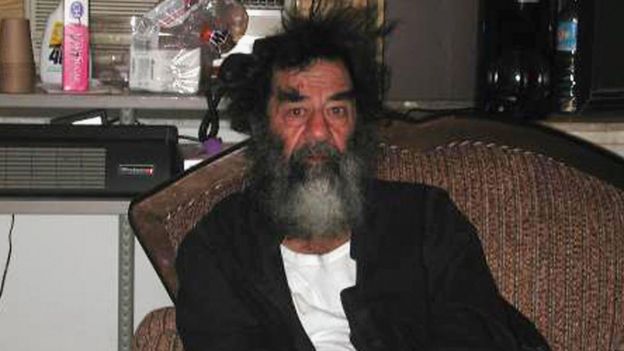What the ex-CIA agent who interrogated Saddam Hussein says about him
4th January 2017
When former Iraqi President Saddam Hussein was captured in December 2003, the CIA required a specialist who could identify and interrogate him for information. That person was John Nixon.
Mr Nixon had studied Saddam Hussein since joining the CIA in 1998. His role was to gather insight into leaders around the world, analysing "what made them tick," he tells the BBC's Victoria Derbyshire programme.
"When a crisis hits, policy makers come to us with the questions about who these people are, what they want, why are they doing this."
He had been in Iraq when the ousted leader was discovered by US troops in a small, underground hole next to farm buildings near his hometown of Tikrit.
When the news of Hussein's discovery came through, the US needed him to be identified - a task presented to Mr Nixon.
There had been rumours at the time that Saddam Hussein had numerous body doubles, but Mr Nixon - who left the CIA in 2011 - says "there was no doubt in my mind as soon as I saw him, that it was him".

Mr Nixon took on the role of interrogator and was the first person to question Saddam Hussein at length, doing so across a number of days.
"I had to keep pinching myself that I was questioning the most wanted man in the world. It seemed ludicrous," he says.
Mr Nixon, author of Debriefing the President: The Interrogation of Saddam Hussein, describes the former leader as a "mass of contradictions".
He saw "the human side" of Saddam Hussein, he says, in great contrast to the depiction presented by US media.
"He was one of the most charismatic individuals I've ever encountered. When he wanted to be he could be charming, nice, funny and polite."

"There were two or three occasions when my questioning got on his bad side," Mr Nixon says.
Hussein had been unrestrained as he sat in the small, dingy room in which he was interrogated, sitting on a metal, foldable chair.
Only Mr Nixon, a polygrapher and an interpreter were also present in the room.
Nevertheless, Mr Nixon says the former leader - as a narcissist - "liked the interaction he got by talking to me".
At the end of the first session, in which Mr Nixon tried to establish a rapport with Saddam Hussein in the hope he would cooperate, Saddam said he had enjoyed the conversation.
"He had been in hiding for months and hadn't had many conversations," Mr Nixon says.
It was a positive start, but the next day Mr Nixon says Saddam Hussein "came back more suspicious".
"He is one of the most suspicious men I've ever met - every question I asked him he had one for me."
Mr Nixon admits the CIA had little to offer Hussein in the way of an incentive to speak.
"We had to appeal to sense of history and the prospect of him getting his views heard on record, and by the highest of powers in the world."
"I knew I had to try and get answers.
"Working for the agency, you are taught how to debrief sources and make them into potential assets.
"But you have to be very careful as you don't want to risk not being able to extract the most information possible by going at a topic in the wrong way."
The most important subject area was that of weapons of mass destruction (WMDs).
The US and UK had used allegations of Iraqi WMDs as a key reason for going to war.
Mr Nixon says "it was all the White House wanted to know", but - from his conversations with Saddam Hussein, his advisers and subsequent research to verify or dismiss his claims - he came to the conclusion that the former Iraqi leader had stopped the country's nuclear weapons program years before and had not intended to restart it.
It was a view that led him and his colleagues to be seen as "failures".
He was not invited to debrief President George W Bush until five years later, in 2008, following separate findings on Saddam Hussein from the FBI.
Mr Nixon is particularly scathing of President Bush, saying - as one of few people that have shaken the hands of both him and Saddam Hussein - he would rather spend time with the latter.
"I used to think what we said at the CIA mattered and the president would listen, but it doesn't matter what we say, politics trumps intelligence."
Mr Nixon says he is "ashamed" of what has happened in Iraq since the ousting of Saddam Hussein.
He says the Bush administration gave no thought as to what events might take place after Saddam's removal, and - in light of the rise of extremist groups such as the so-called "Islamic State" - believes the region would have been better off had he remained in place.
Such claims have been dismissed by former UK Prime Minister Tony Blair, who led the country at the time of the invasion.
BBC

